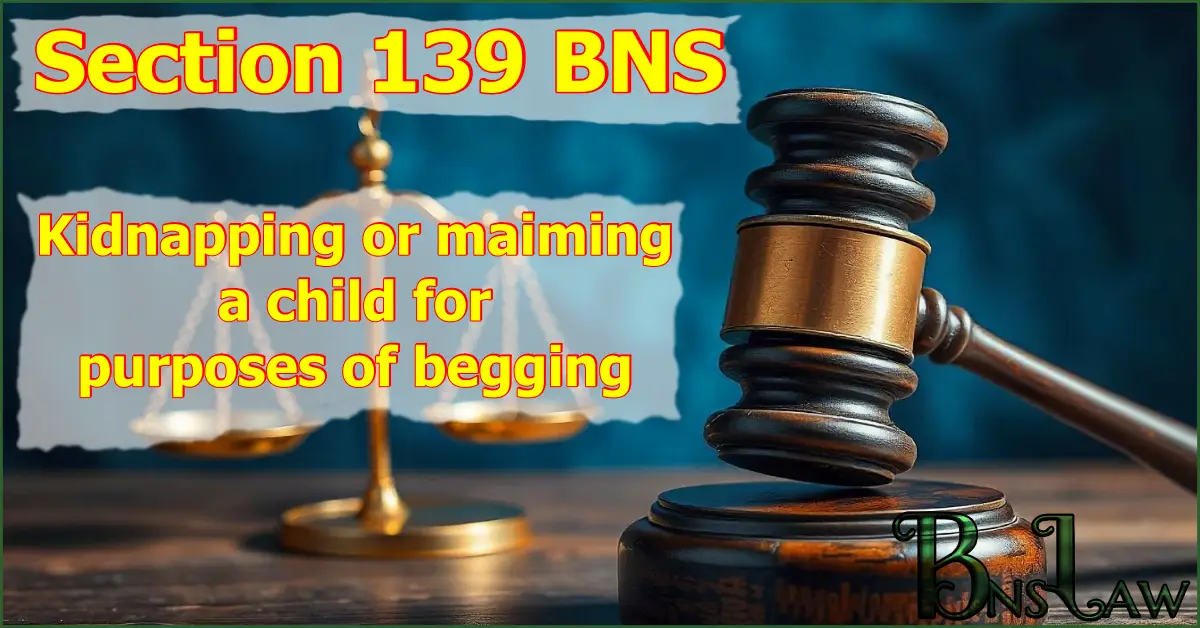Section 139 BNS | BNS 139
139(1) BNS
Whoever kidnaps any child or,not being the lawful guardian of such child, obtains the custody of the child, in order that such child may be employed or used for the purposes of begging shall be punishable with rigorous imprisonment for a term which shall not be less than ten years but which may extend to imprisonment for life, and shall also be liable to fine.
139(2) BNS
Whoever maims any child in order that such child may be employed or used for the purposes of begging shall be punishable with imprisonment which shall not be less than twenty years, but which may extend to life which shall mean imprisonment for the remainder of that person’s natural life, and with fine.
139(3) BNS
Where any person, not being the lawful guardian of a child employs or uses such child for the purposes of begging, it shall be presumed, unless the contrary is proved, that he kidnapped or otherwise obtained the custody of such child in order that such child might be employed or used for the purposes of begging.
139(4) BNS
In this section “begging” means—
(i) soliciting or receiving alms in a public place, whether under the pretence of singing, dancing, fortune telling, performing tricks or selling articles or otherwise;
(ii) entering on any private premises for the purpose of soliciting or receiving alms;
(iii) exposing or exhibiting, with the object of obtaining or extorting alms, any sore, wound, injury, deformity or disease, whether of himself or of any other person or of an animal;
(iv) using such child as an exhibit for the purpose of soliciting or receiving alms.
READ OTHER SECTIONS OF CHAPTER VI — OF OFFENCES AFFECTING THE HUMAN BODY
FAQs of BNS Section 139
-
139 BNS punishment and fine
Punishment and fine under Section 139 of the BNS—
BNS 139(1): Rigorous imprisonment not be less than 10 years but which may extend to imprisonment for life, and fine.
BNS 139(2): Imprisonment not be less than 20 years which may extend to remainder of that person’s natural life, and fine. -
139 BNS cognizable or not
The offence under Section 139(1) and 139(2) of the BNS is cognizable.
-
139 BNS bailable or not
The offence under Section 139(1) and 139(2) of the BNS is non-bailable.
-
139 BNS trial court
Offence specified in Section 139(1) of the BNS is triable by the Magistrate of the first class while the offence specified in Section 139(2) is triable by the Court of Session.
Important Points
- Cognizable Offences: These are offences where a police officer can arrest a person without a warrant.
- Non-Cognizable Offences: These are offences where a police officer cannot arrest a person without a warrant.
- Bailable Offences: These are offences where the accused can get bail from the police station itself. All bailable offences are listed in the First Schedule of the Bharatiya Nagarik Suraksha Sanhita (BNSS).
- Non-Bailable Offences: Offences in which bail is not granted directly from the police station but after hearing the case in the court, the judge decides when bail will be granted. All non-bailable offences are listed in the first schedule of the Bharatiya Nagarik Suraksha Sanhita (BNSS).
- In the above FAQ, “trial court” means the court that has jurisdiction to try the offence.
- In the above FAQ, the expression “Magistrate of the first class” and “Any Magistrate” does not include Executive Magistrates.
Read other Sections of the BNS
Reference Link: New Criminal Laws (BNS), Ministry of Home Affairs







